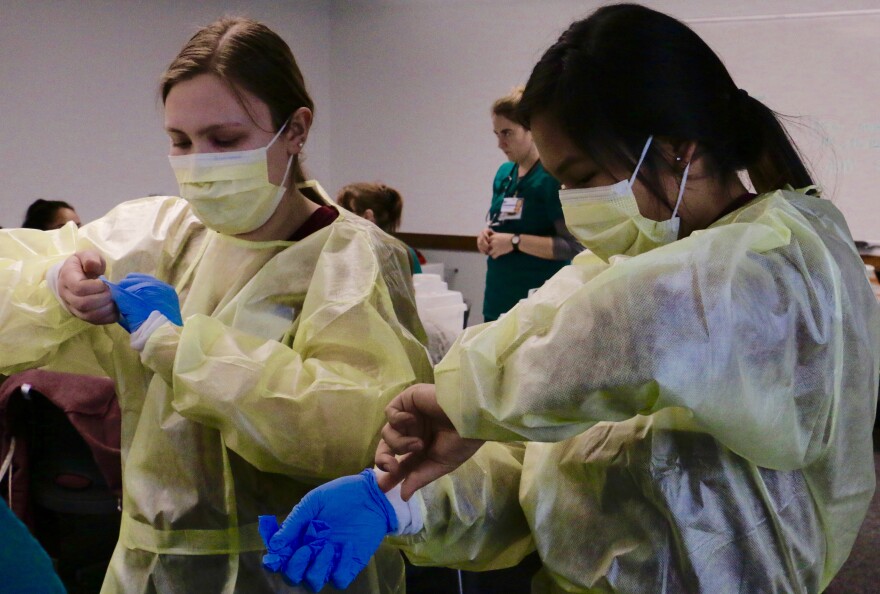More and more programs have sprung up locally to familiarize students with trades and professions in the hopes of getting more Alaska Natives employed. That’s what the University of Alaska Anchorage did 20 years ago for Alaska Native nurses. The program is called RRANN: Recruiting and Retaining Alaska Natives into Nursing. Over the weekend, RRANN held a camp in Bethel for high schoolers to show them how they, too, can enter the field.
Transcript:
Instructor 1: “Where are we giving this medication?”
Dull: “Intramuscular.”
The place is Yuut Elitnaurviat, Bethel’s adult workforce training center. The needle is a 23 gauge; the dosage is 2.5 mililiters of morphine. And the target?
Instructor 2: “So imagine this is an entire butt cheek.”
Bethel Regional High School junior Hunter Dull raises his needle. The morphine is actually saline solution, and the butt cheek is a slab of rubber.
Dull: “You’re going to feel a slight pinch.”

Instructors 1 & 2: “One, two, three, and then in at a 90 degree angle.”
His instructors are University of Alaska Anchorage nursing students who are studying in Bethel. Hunter Dull hopes to one day do this work for real.
Dull: “I never thought I would inject someone until now. It just became reasonably more visible in my future.”
And that’s the point of this RRANN camp: to give high schoolers the hands-on experience they need to see themselves as nurses, and to offer them the tools and guidance to get there.
At another table, a group is learning how to check for a pulse.
Hoffman: “Always best to listen for a whole minute.”
Each student unwraps a stethoscope to keep. One writes on hers, “Dr. Paul.”
Paul: “My name is Brea Paul from Kwigilingok, Alaska, just down the coast."
Then she adds in Yup'ik: "I’m going to be a doctor.”
Paul is a high school junior. She wants to go into medicine to help people in villages like hers that are far from hospitals. She made the decision when she was 10 years old.
Paul: “My grandpa was very, very sick, and he was stuck in the village. And the weather was so bad, and the planes couldn’t go there.”
For Tuntutuliak high school junior Katya John, helping her grandmother and her mother through their cancers drew her to nursing.

John: “I liked taking care of her [my mom], because I had more time with her and it felt good helping someone else.”
Both John and Paul want to provide their nursing care in Yup’ik.
White: “So one of the most beautiful things about teaching in Bethel is getting students who are fully Yup’ik speaking, or at least partially Yup’ik speaking.”
Rachelle White teaches nursing in Bethel through the University of Alaska Anchorage. She says that having a Yup’ik speaker giving care makes a big difference, especially with elders.
White: “There’s just such a change in the demeanor of the patient. The patient that seems a little scared and quiet all of a sudden lights up, and they begin to speak Yup’ik back and forth with each other.”
White’s eight nursing students stand out in their green scrubs as they instruct the high schoolers. Melody Hoffman is one of the nursing students. She grew up in Bethel and is in her second semester of the program.
Hoffman: When I graduated high school, I knew I wanted to be a nurse, but I was kind of lost. I didn’t know what to do. I didn’t know what classes to take.”
That was 10 years ago. Hoffman says that if she had gone to a camp like this and gotten connected to RRANN earlier, things could have been easier.
Hoffman: “Then I would have been a nurse years ago, probably.”

RRANN provides support, tutoring, and scholarships. Three seniors who attended the camp are already heading to University of Alaska Anchorage in the fall as nursing pre-majors.
Matthew Hunter from Bethel Regional High School is ready to go.
Hunter: “As I was younger, my mom was going to nursing school, and I wanted to follow in her footsteps. And when she told me she couldn’t finish, that’s going to motivate me through.”
And RRANN will be there to help.



